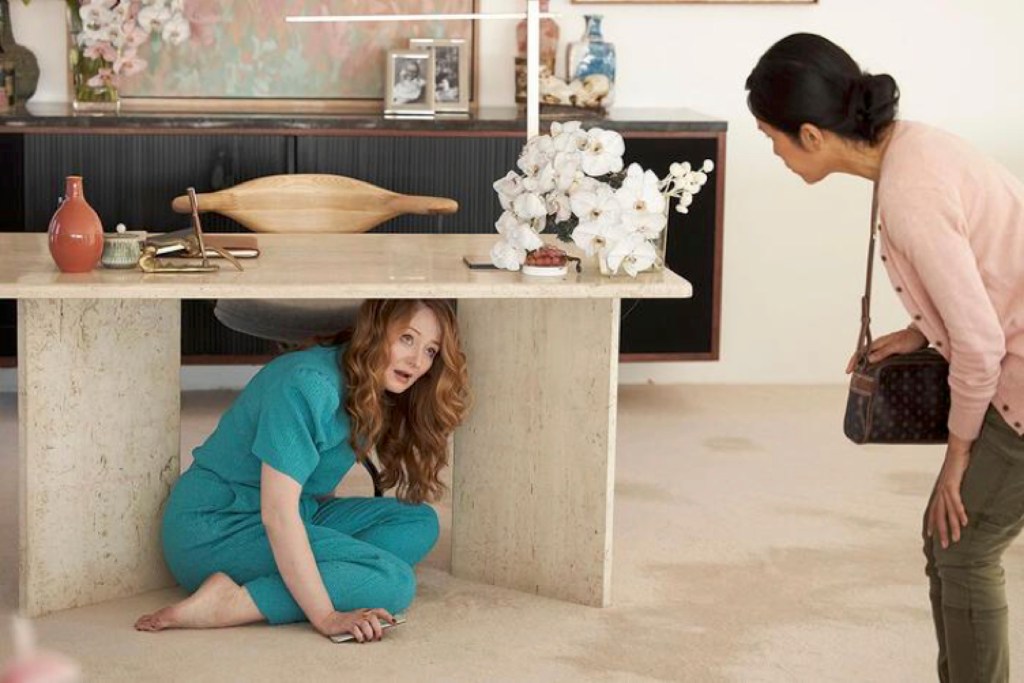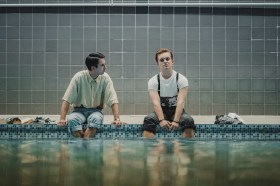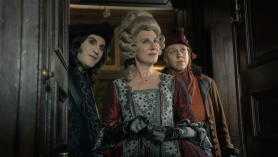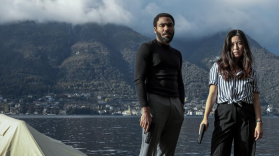If you’re the child of Filipino migrants, Australian media is an isolating and lonely place to see yourself. There are few depictions of Filipino people that show the complexity of our lived experiences or attempt to provide varied cultural narratives. I’m longing to see more than stories about beauty queens, mixed-race models, hip-hop dancers, gold diggers, mail-order brides, nurses and maids. Our cultural symbols need to be more than bonds over adobo, Jollibee, Magic Sing and BalikBayan boxes or religious paraphernalia (or trauma).
Even though Filipino Australians are hungry to see themselves on screen, I think it’s valuable to critique the kind of representation Australian media is willing to show.
The Filipino-Australian community has been haunted by racist and hypersexualised representations of Filipino women on screen for decades. The ping pong ball scene in Priscilla, Queen of the Desert was a degrading caricature of a Filipina that researchers and organisations have argued normalises violence towards Filipinas. The sensationalist media portrayal of Rose Porteous’ life as a ‘gold-digger’ in the 1980s became a part of the growing vitriol against Filipinas as ‘Mail-order brides’.
There are scarce depictions of Filipino stories that reflect our lives with care and dignity because they were written by people who didn’t consider the harm they would cause to our community.
Read: Australian ads are still made by white people, for white people
I want representation of Filipino people and cultures. But I am advocating for creatives to consider the importance of dignified representation and meaningful community engagement. I want creatives to consider the impact their narratives will have on shaping how Filipinos are perceived, treated or harmed for many decades as a result of their stories. I want creatives to consider their artwork as a potential vehicle for community connection and critical conversations.
I want creatives to consider the impact their narratives will have on shaping how Filipinos are perceived, treated or harmed for many decades as a result of their stories.
A few months ago, The Unusual Suspects was released. It’s a four-part series starring Filipino women plotting a heist. While this show is the most contemporary representation of Filipinos on Australian screen, it falls short of anything culturally relevant for us. This is a result of the poor community engagement with Filipino organisations and the lack of cultural safety practices throughout development. This show is emblematic of the deep-rooted racism in the arts industry and the way predominantly white institutions are gatekeepers for stories about historically excluded groups.
Read: TV Review: The Unusual Suspects is authentic and refreshing
What does it mean to tell a story about Filipino-Australians without a majority of Filipino creatives in the writers room? What does it mean to tell an ‘authentic’ Filipino story if the majority of creatives working on the show are not Filipino or Filipino women?
I know there will be Filipinos who love the show, and of course, why wouldn’t they? The cast are fantastic actors and it’s great to see people who look like us on screen. But as a community, how do we grapple with the importance of visibility when our stories are empty of cultural complexities?
It’s great to see people who look like us on screen. But as a community, how do we grapple with the importance of visibility when our stories are empty of cultural complexities?
I have been battling with these questions since I heard about the development and production of The Unusual Suspects over a year ago. Despite what the articles, videos, and social media posts may have you believe about the creation of this show, many community organisations raised concerns about the development of this story.
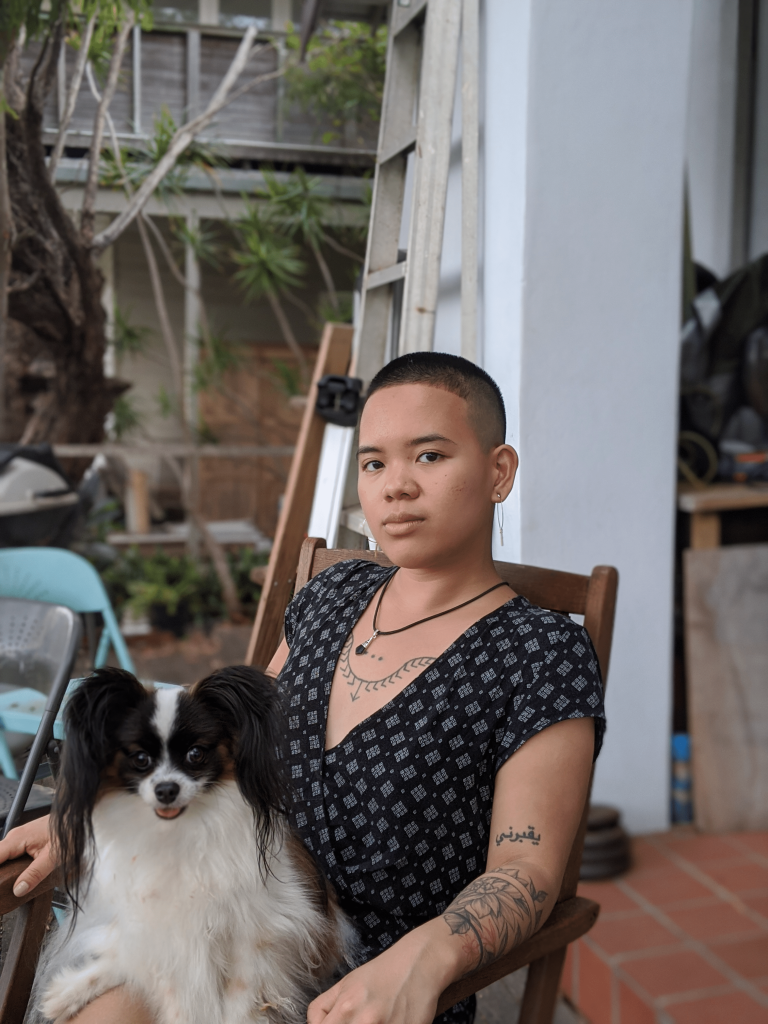
As a Filipinx creative and researcher, I had the opportunity of helping members of the Filipino organisations Migrante Australia, Gabriela, and PAWA as a consultant. When raising their concerns with the broadcaster and the production company, I used my research background to highlight how the show was reinforcing – not challenging – racist stereotypes of Filipinos.
During the meeting, members of these organisations spoke tearfully about the negative impacts of Filipina representation – how they advocated for and supported Filipinas who experienced violence as a result of racist representations of Filipinas in the media. The creators and the TV network were made aware of how the show’s premise of theft and dishonesty has led to the abuse of Filipino domestic workers overseas. There were community members in that meeting that had written to SBS decades ago about the problematic portrayal of Cynthia in Priscilla, Queen of the Desert – their concerns were ignored then because it was a ‘comedy’.
Racist stereotyping and discrimination towards historically excluded groups on screen are justified because it’s considered entertainment. I love comedy and I love to laugh, but it’s not a joke to the people who are directly harmed in the name of creative expression. It becomes very clear when stories about people of colour are intended for viewers who want stories that affirm, instead of challenge, their view of historically excluded groups.
In the case of The Unusual Suspects, conversations about cultural safety only started after concerns about the script and characters were raised during the casting stage. There were no Filipinos involved in the early development of the show. While Filipino creatives were later included in development and production, we should be critical of an industry where cultural safety practices are not the norm. It is also concerning that a show focusing so much on Filipino women didn’t have Filipino women developing or writing the show. The result is a story that is ignorant of the migrant experiences of Filipino-Australians; a gross oversimplification of Filipino cultures; insensitive to the plights of Overseas Filipino Workers (OFWs); and a failure to employ Filipino creatives who haven’t had the opportunity to get the necessary experience in the industry.
Read: Jessica Magro and Pasifika pride: the power of visibility
There is a problem in the arts industry where people feel they can tell stories about historically excluded groups without having to demonstrate they have done the appropriate research and community engagement necessary to ensure dignity and care have been embedded into these stories.
The Unusual Suspects has been touted as a story of female friendship and vital representation for Filipino migrants – but it is far from being the story it promises. While this is not a comprehensive list, I’ve provided a short critique of the inaccuracies within the show as well as the questionable way Filipino people have been represented.
- Australia isn’t a destination for Filipino domestic workers
The show was created on the premise that Filipino people in Australia are maids, nannies or domestic workers when that’s not the case for many Filipino-Australian migrants. For OFWs, more common destinations for domestic work include Saudi Arabia, United Arab Emirates, Hong Kong and Taiwan.
Much of the Filipino migrant population have arrived in Australia on the skilled migration stream. Essentially, the show was built on the big fallacy that many Filipino-Australian migrants are domestic workers.
Why did the original creators of this show immediately think of Filipino maids? My hot take suspicion is the ongoing obsession with Rose Porteous (formerly Hancock) who worked as a maid for Lang Hancock, the mining magnate. In the eyes of the Australian media and Gina Rinehart’s vocal hatred against her, Rose became the symbol of the gold digging Filipina who was a maid turned millionaire.
2. Claims of theft are used to justify abuse towards OFWs
The show fails to understand the global nuances of creating a storyline about Filipino maids and nannies who steal from their employers. In countries like Singapore, Hong Kong, and the Gulf countries, OFWs have been murdered and abused on the suspicion of theft. OFWs have tenuous human rights and workers rights, and often experience abuse from their employers with little avenues to seek justice. This show fails to understand that the premise of the heist is racist and historically dangerous towards Filipino workers. A show built on a racist trope can’t be made to appear as a win for Filipino representation.
A show built on a racist trope can’t be made to appear as a win for Filipino representation.
If the creators of The Unusual Suspects were serious about writing a show about domestic workers and Filipino women, they would have taken more care to engage with feedback from organisations that directly provide support to members of the Filipino community.
3. It reinforces stereotypes of Filipinas
I am shocked but not surprised that a Filipina in the show was called a ‘gold-digging Mail-order bride’. What is subversive about saying this on a major TV network when many Filipinas have lived through and still experience discrimination in real life?
Depictions of Filipino people, especially Filipinas, have been riddled with racist stereotypes from major Australian media. It’s the reason why we have the violent (and historically inaccurate) depiction of Filipinas as mail-order brides. For those unfamiliar with the research in the past few decades, there were, in actuality, low levels of marriage migration from the Philippines in the 1980s-1990s. But we’re left with the media representations of Filipinas as derogatory and hypersexualised, and this has often led to violence and abuse towards the Filipino community.**
4. White women and Filipino women don’t share the same experience of womanhood
When Sara tells Evie that ‘we both abandon our children’, it became more obvious to me that no one bothered to actually do the research. A wealthy white woman employing a nanny to look after her children is not comparable to OFWs who work overseas to ensure their children have better education and a better shot at life. When watching this show, it’s very clear that whatever the relationship the women have, it’s not friendship – it’s a transaction with much more risk put on the Filipino women in the heist than on the white women.
5. They don’t actually care about OFW stories
This show makes little attempt to represent Filipino Australian stories. Instead, they have co-opted a complex history of labour migration and the difficulties experienced by OFWs into a comedy heist. Towards the end of the show, one of the Filipino characters actually says she wants to be deported back to the Philippines. In an alternate reality where OFWs did go to Australia for work (which they don’t) no one wants to be deported. I also think it makes light of issues faced by asylum seekers and refugees because one of the characters says she’ll willingly go to Villawood, an immigration detention centre located in Western Sydney. The character wants to be deported because she participated in the crime but also wants to see the daughter she left back in the Philippines. The show touches on sensitive and complex issues but uses them more as a plot device rather than with the intention to provide a careful critique of the sacrifices OFWs make to provide for their families. Had Filipino community organisations been given an active role in development, perhaps there would have been more care and empathy written into the experiences of women facing deportation.
WHAT WE NEED: STEPS FORWARD
We need to do more than ‘represent’ historically excluded groups
Representation is important for historically excluded people. But the kind of representations in these stories are important: the ideas they challenge, the lives they show, the mirror they raise to our cultures. With so many creatives of colour hoping to have fruitful careers in the arts industry, why do our stories still get told with a majority of white people in development and production?
Shows about historically excluded groups get funding because they want to appeal to ‘representation’ without doing the community work necessary to hire or support creatives of colour throughout the process.
Producers of colour need to be funded and trusted to tell their own stories
It is systemic racism when a story not written by a majority of Filipino creatives could be developed or funded. It is systemic racism when Filipino organisations are not listened to or heard when they want a say on a story that impacts members of the community. There needs to be better mechanisms in place for cultural safety practices and for community engagement and feedback. The creators of the show failed to respond to the concerns of the Filipino community organisations. It was a long, demoralising process with no resolution. And yet, they turn around and say this show was for the Filipino community?
When shows are based on racist stereotypes or are culturally insensitive, finding POC creatives to work on that show won’t make it less racist. POC creatives shouldn’t be used to legitimise whitewashed shows under the guise of representation.
We need an industry that prioritises the wellbeing and careers of creatives of colour holistically. We need stories about representation to be co-created with community care. We need creatives who prioritise dignified representation.
**
Please see the works cited below by Cleonicki Saroca. You can also read my thesis, The ‘Mail-Order bride’: Orientalism, intimacy and gendering experience here, where I examine representations of Filipino women in Australia.
Reading list
- Chuah, F, Oatario Chuah, L, Reid-Smith, L, Rice, A & Rowley, K (1987) ‘Does Australia Have a Filipina Brides Problem?’, Australian Journal of Social Issues 22(4):573-583
- Hilsdon, A (2003) “What the Papers Say: Representing Violence Against Overseas Contract Workers.” Violence Against Women, 9:6, 698–722
- Piper, N & Roces, M (2003) Wife or Worker?: Asian women and migration, Rowman & Littlefield Publishers: Lanham
- Saroca, N (2006) ‘Woman in Danger or Dangerous Woman? Contesting Images of Filipina Victims of Domestic Homicide in Australia’, Asian Journal of Women’s Studies 12(3):35-74
- Saroca, C (2006) ‘Filipino Women, Migration, and Violence in Australia: Lived Reality and Media Image’, Kasarinlan: Philippines Journal of Third World Studies 21(1):75-110
- Saroca, C (2013) ‘The Absent and Silenced Voices in Media Representations of Filipina Victims of Homicide in Australia’, South East Asia Research 21(3): 517-543
- Filipino maid leaps to death after Hong Kong bosses fire her for unproven theft
- OFW Jennifer Dalquez escapes death row, gets 5 years for theft
- 3 OFWs accused of stealing released from detention, to be turned over to Jeddah Philippine Consulate General
- Last batch of trafficked OFWs leave Syria as traffickers, recruiters face cases
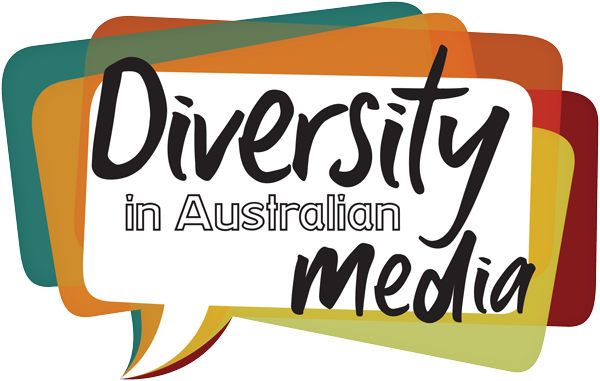
This article has been created in partnership with Diversity in Australian Media.
Learn more about Diversity in Australian Media by joining the Facebook group, or following them on Twitter.

This initiative is supported by Diversity Arts Australia, made possible through funding from Create NSW and Australia Council for the Arts.
